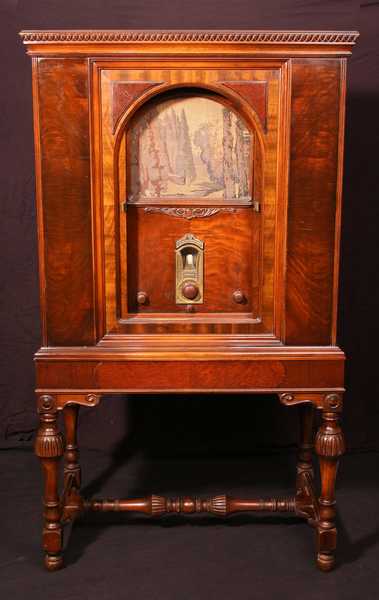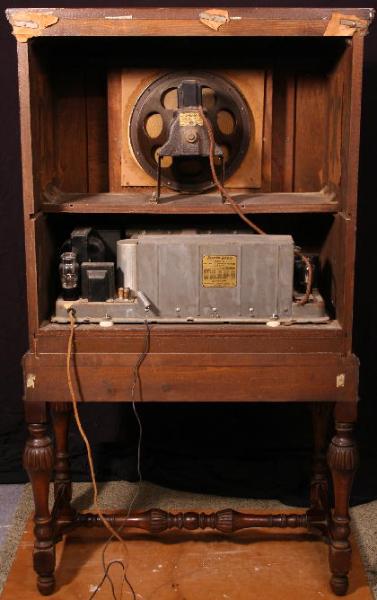| TubeRadioLand:Home > Philco > 95 |
Philco Model 95 Highboy & Highboy Deluxe Radios (1929)
Philco's model 95 9-tube screen-grid plus chassis
was introduced in October of 1929, a little over a
year after the company's debut as a radio manufac-
turer (see announcement at the foot of this column).
And what a radio it was too! Reportedly designed
with the help of Hazeltine Labs, its TRF circuitry per-
formed extremely well. Plus it sounded very good as
well. Some commentators have perhaps justifiably
pronounced it as being one of the best TRF receiv-
ers of the era!
The 95 was offered for sale in a choice of the Low-
boy, Highboy, Highboy Deluxe and Tudor cabinets
that had been available since June of 1929, outfitted
with Philco's model 65 screen-grid or model 87 neut-
rodyne-plus chassis. It could also be purchased as
a table model, with a cabinet similar to the Spanish
brown model 511 from 1928. This same table model
had been available since June with a type 65 chas-
sis.
Both the model 95 Highboy-Deluxe and the 95 High-
boy are featured on this page. The Highboy Deluxe
(right) was Philco's premier model for the season,
the cabinet comprising exquisite veneers and fancy
moldings. It had a sales price of $225, not including
tubes. That would be $3090 in today's dollars! The
95 Highboy, in a less expensive though still impres-
sive cabinet (lower right), listed at $169.50 (less
tubes). Both cost $10 more in the Western USA.
Philco's cabinets at this time were claimed by the
company to be products of a strategy of manufact-
uring radio sets that were truly beautiful "articles of
furniture". In this I believe they were highly success-
ful, for these stunning models are as remarkable in
appearance as they were in 1929 as receiving app-
aratus. Below, I have reproduced two articles, found
in 1929 newspapers, one describing features of the
95 Highboy cabinet and the second overviewing
Philco's philosophy of producing cabinets that were
quality furniture pieces.
With what had become typical Philco flare, the 95's
introduction was accompanied with an advertising
blitz and much media fanfare. To top it all, a jumbo
version of the 95 Highboy was produced as a sales
tool. It was 16 feet high, 8 feet wide and 5 feet
deep. This giant radio was hauled around the
country between Philco dealers, who displayed it
prominently in public places for several days at a
time. Inside was a production model 95, connected
through booster amplifiers to a large speaker
placed behind the jumbo's speaker panel. Radio
programs and phonograph records were played
through the giant set, with almost a continuous pro-
gram issued forth to entertain those who gathered
to listen. What a spectacle it must have been! The
campaign was successful, since almost 100,000*
models using the Highboy cabinet (16,500 using the
Deluxe) were sold. Some ads showing some of the
Jumbo Philcos can be seen at these links:- 1, 2, 3.
On the technical side, the model 95 is an impres-
sive radio. It incorporates Philco's screen-grid plus
chassis which embodied all of their latest radio ad-
vances, including (with words from their original
advertisements shown in italics):- "automatic volume
control" (to combat fading of weak stations and
blasting by strong ones), "new super-sharp select-
ivity" (helped by the use of double tuned circuits in
the front end), "almost auditorium volume" (using
two of the new type 245 tubes in push-pull along
with an electrodynamic speaker), an "entirely new
circuit to automatically reduce background noise
and static", all this combined with "enormous pow-
er, making it easy to get distant stations".
The screen-grid plus chassis has the following tube
line-up:- 224 * 3 (three stages of RF amplification),
227 (2nd detector/AVCdiode), 227 (detector amp)**,
227 (1st AF), 245 * 2 (push-pull AF output) and
280 (rectifier). The 224s used as RF amplifiers are
the screen grid tubes of the chassis' namesake.
These tubes had the benefit of not needing to be
neutralized, unlike the earlier type 26 triodes used
by Philco's older neutrodyne-plus chassis (see my
511 page). One point of additional note is that the
model 95 was the first radio to combine the function
of the 2nd detector and automatic-volume-control,
using a clever circuit developed by Harold Wheeler
at the Hazeltine Corporation. The schematic can
be found here, courtesy of NostalgiaAir.
I found the wonderful Highboy at a flea market in
2005 and one day soon I hope to hear it playing
again. The Deluxe I purchased from the estate of a
local collector, fully restored and playing beautifully.
Both sets are cosmetically in fully original condition.
Definitely two of my favorite consoles!
* - production figures sourced from philcoradio.com
** - see the foot of my Philco 111 page for an explanation
of the Philco "detector amp".
was introduced in October of 1929, a little over a
year after the company's debut as a radio manufac-
turer (see announcement at the foot of this column).
And what a radio it was too! Reportedly designed
with the help of Hazeltine Labs, its TRF circuitry per-
formed extremely well. Plus it sounded very good as
well. Some commentators have perhaps justifiably
pronounced it as being one of the best TRF receiv-
ers of the era!
The 95 was offered for sale in a choice of the Low-
boy, Highboy, Highboy Deluxe and Tudor cabinets
that had been available since June of 1929, outfitted
with Philco's model 65 screen-grid or model 87 neut-
rodyne-plus chassis. It could also be purchased as
a table model, with a cabinet similar to the Spanish
brown model 511 from 1928. This same table model
had been available since June with a type 65 chas-
sis.
Both the model 95 Highboy-Deluxe and the 95 High-
boy are featured on this page. The Highboy Deluxe
(right) was Philco's premier model for the season,
the cabinet comprising exquisite veneers and fancy
moldings. It had a sales price of $225, not including
tubes. That would be $3090 in today's dollars! The
95 Highboy, in a less expensive though still impres-
sive cabinet (lower right), listed at $169.50 (less
tubes). Both cost $10 more in the Western USA.
Philco's cabinets at this time were claimed by the
company to be products of a strategy of manufact-
uring radio sets that were truly beautiful "articles of
furniture". In this I believe they were highly success-
ful, for these stunning models are as remarkable in
appearance as they were in 1929 as receiving app-
aratus. Below, I have reproduced two articles, found
in 1929 newspapers, one describing features of the
95 Highboy cabinet and the second overviewing
Philco's philosophy of producing cabinets that were
quality furniture pieces.
With what had become typical Philco flare, the 95's
introduction was accompanied with an advertising
blitz and much media fanfare. To top it all, a jumbo
version of the 95 Highboy was produced as a sales
tool. It was 16 feet high, 8 feet wide and 5 feet
deep. This giant radio was hauled around the
country between Philco dealers, who displayed it
prominently in public places for several days at a
time. Inside was a production model 95, connected
through booster amplifiers to a large speaker
placed behind the jumbo's speaker panel. Radio
programs and phonograph records were played
through the giant set, with almost a continuous pro-
gram issued forth to entertain those who gathered
to listen. What a spectacle it must have been! The
campaign was successful, since almost 100,000*
models using the Highboy cabinet (16,500 using the
Deluxe) were sold. Some ads showing some of the
Jumbo Philcos can be seen at these links:- 1, 2, 3.
On the technical side, the model 95 is an impres-
sive radio. It incorporates Philco's screen-grid plus
chassis which embodied all of their latest radio ad-
vances, including (with words from their original
advertisements shown in italics):- "automatic volume
control" (to combat fading of weak stations and
blasting by strong ones), "new super-sharp select-
ivity" (helped by the use of double tuned circuits in
the front end), "almost auditorium volume" (using
two of the new type 245 tubes in push-pull along
with an electrodynamic speaker), an "entirely new
circuit to automatically reduce background noise
and static", all this combined with "enormous pow-
er, making it easy to get distant stations".
The screen-grid plus chassis has the following tube
line-up:- 224 * 3 (three stages of RF amplification),
227 (2nd detector/AVCdiode), 227 (detector amp)**,
227 (1st AF), 245 * 2 (push-pull AF output) and
280 (rectifier). The 224s used as RF amplifiers are
the screen grid tubes of the chassis' namesake.
These tubes had the benefit of not needing to be
neutralized, unlike the earlier type 26 triodes used
by Philco's older neutrodyne-plus chassis (see my
511 page). One point of additional note is that the
model 95 was the first radio to combine the function
of the 2nd detector and automatic-volume-control,
using a clever circuit developed by Harold Wheeler
at the Hazeltine Corporation. The schematic can
be found here, courtesy of NostalgiaAir.
I found the wonderful Highboy at a flea market in
2005 and one day soon I hope to hear it playing
again. The Deluxe I purchased from the estate of a
local collector, fully restored and playing beautifully.
Both sets are cosmetically in fully original condition.
Definitely two of my favorite consoles!
* - production figures sourced from philcoradio.com
** - see the foot of my Philco 111 page for an explanation
of the Philco "detector amp".
| ||||||
...genuine tapestry ..autumn tints made exclusively for this Philco
| ||||||
| Philco 95 screen-grid plus - HOLD and ENJOY programs from other cities! |
| BALANCED Unit Radio... UNBALANCED Radio Means Distorted Tone |
BALANCED PHILCO Means True Clear Tone
Copyright TubeRadioLand.com
Dec 17th
1929, Pa
1929, Pa
Apr 21st 1930, Bakersfield, Ca
Philco Model 95 Highboy Deluxe
Philco Model 95 Highboy
Philco Model 95 Highboy Deluxe
Announcements for Philco's Screen-
Grid Plus. (L) "Radio" Magazine, Nov
1929. (R) Reno Evening Gazette, Nov
22nd 1929.
Grid Plus. (L) "Radio" Magazine, Nov
1929. (R) Reno Evening Gazette, Nov
22nd 1929.
| Click on any thumbnail to enlarge.. |
Oct 31st, Illinois









